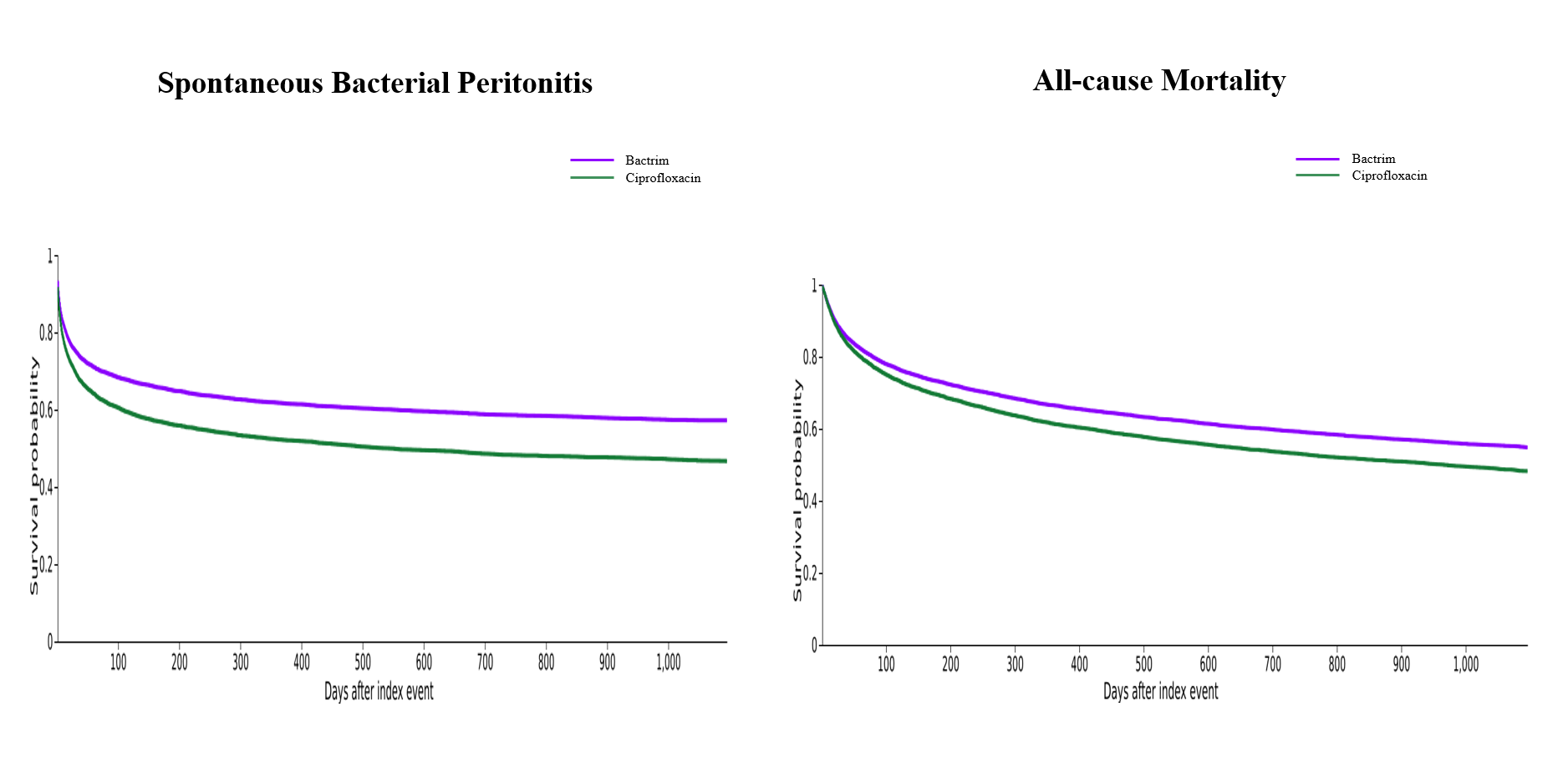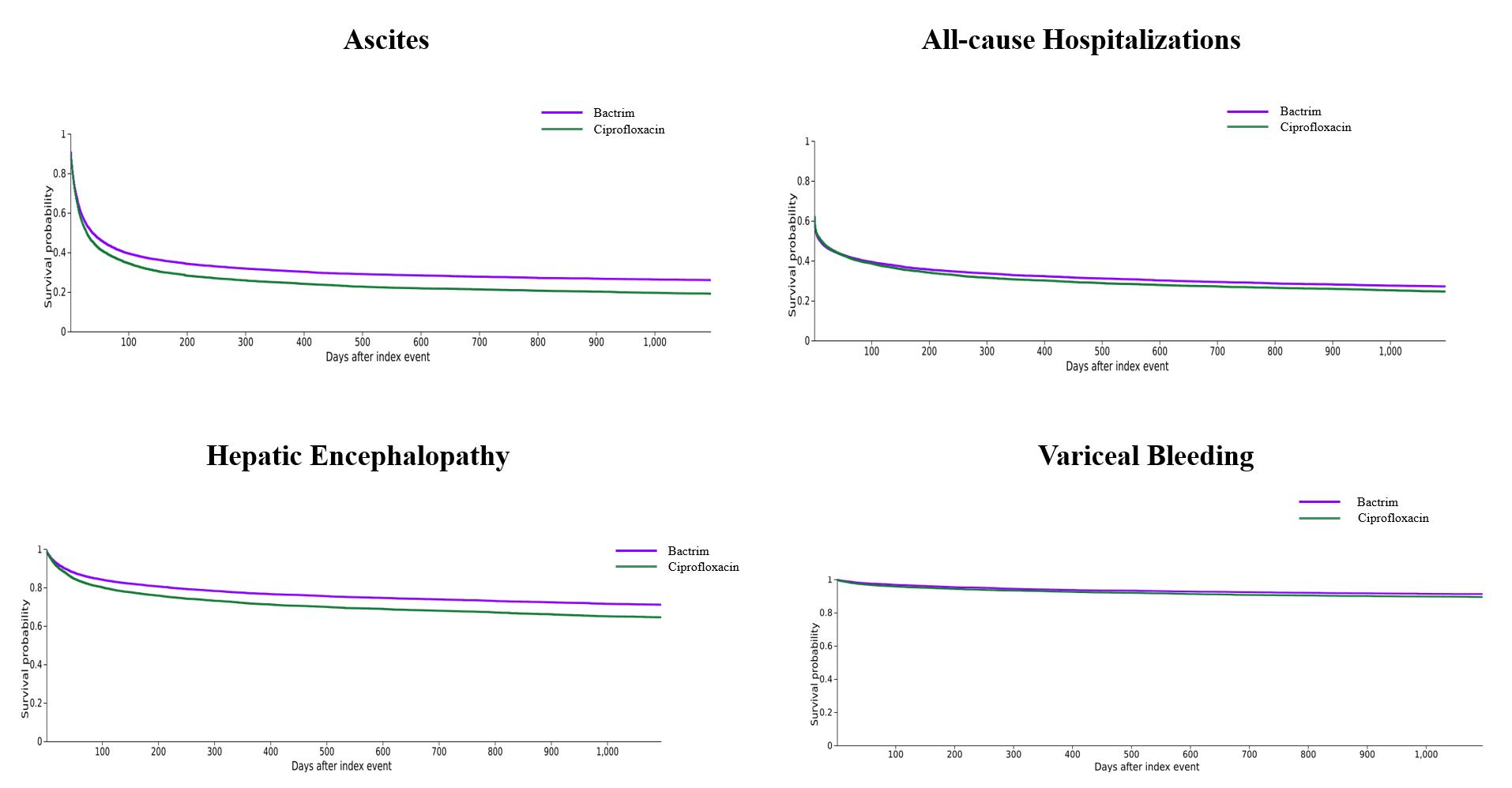Oral Paper Presentation
Annual Scientific Meeting
Session: Plenary Session 3A: Liver / Functional
37 - Secondary Prophylaxis of SBP in Cirrhosis: Bactrim vs Ciprofloxacin in a Propensity-Matched Real-World Study
Tuesday, October 28, 2025
2:15 PM - 2:25 PM PDT
Location: North Ballroom 120D

Mohamad Mahdi Osman, DO
Cleveland Clinic
Cleveland, OH
Presenting Author(s)
Mohamad Mahdi Osman, DO1, Mohamad-Noor Abu-Hammour, MD1, Leandro Sierra, MD2, Omar Sims, PhD3, Walid Hazem, DO4, Dian Jung Chiang, MD1
1Cleveland Clinic, Cleveland, OH; 2Cleveland Clinic, Cleveland, OH; 3Cleveland Clinic Foundation, Hoover, AL; 4University Hospitals Cleveland Medical Center, Cleveland, OH
Introduction: Spontaneous bacterial peritonitis (SBP) is a common and life-threatening complication in patients with cirrhosis. Secondary prophylaxis with antibiotics such as trimethoprim-sulfamethoxazole (Bactrim) or ciprofloxacin is recommended to prevent recurrence. However, real-world comparative data on the efficacy of these regimens remain limited. This study aimed to evaluate clinical outcomes among cirrhotic patients with prior SBP receiving Bactrim versus Ciprofloxacin for SBP prophylaxis.
Methods: Using the TriNetX research network, we identified adult patients with cirrhosis and a documented episode of SBP who were prescribed either Bactrim (n = 11,166) or Ciprofloxacin (n = 19,845) for secondary prophylaxis. After 1:1 propensity score matching based on demographics, liver function, MELD components, diabetes status, hemoglobin A1c (A1c), and body mass index (BMI); 11,140 matched pairs were analyzed. Outcomes were assessed over a three-year follow-up period using time-to-event analysis. The primary outcomes were recurrence of SBP and all-cause mortality. Secondary outcomes included all-cause hospitalizations, ascites, hepatic encephalopathy (HE), and variceal bleeding.
Results: Patients receiving Bactrim had significantly better outcomes than those receiving Ciprofloxacin across nearly all measured endpoints. SBP recurrence was lower in the Bactrim group (HR 0.754, 95% CI 0.723–0.786; p < 0.0001), as was all-cause mortality (HR 0.838, 95% CI 0.804–0.874; p < 0.0001). Significant reductions were also observed in ascites (HR 0.863, 95% CI 0.835–0.891; p < 0.0001), HE (HR 0.786, 95% CI 0.744–0.830; p < 0.0001), and variceal bleeding (HR 0.813, 95% CI 0.731–0.903; p = 0.0001) (Figure 1 and 2). There was a decrease in all-cause hospitalizations in the Bactrim group but there was no statistically significant difference.
Discussion: In this large real-world cohort of cirrhotic patients with prior SBP, Bactrim was associated with lower risks of SBP recurrence, mortality, incidence of ascites, HE, and variceal bleeding compared to Ciprofloxacin. While choice of antibiotic prophylaxis needs to be tailored based on individual and local antibiotic resistance profiles, our study showed that Bactrim may be a more effective option for SBP secondary prophylaxis in this population. Further prospective studies are warranted to confirm these observations and guide clinical decision-making.

Figure: Figure 1 - Primary Outcomes

Figure: Figure 2 - Secondary Outcomes
Disclosures:
Mohamad Mahdi Osman indicated no relevant financial relationships.
Mohamad-Noor Abu-Hammour indicated no relevant financial relationships.
Leandro Sierra indicated no relevant financial relationships.
Omar Sims indicated no relevant financial relationships.
Walid Hazem indicated no relevant financial relationships.
Dian Jung Chiang: Ipsen – Advisory Committee/Board Member.
Mohamad Mahdi Osman, DO1, Mohamad-Noor Abu-Hammour, MD1, Leandro Sierra, MD2, Omar Sims, PhD3, Walid Hazem, DO4, Dian Jung Chiang, MD1, 37, Secondary Prophylaxis of SBP in Cirrhosis: Bactrim vs Ciprofloxacin in a Propensity-Matched Real-World Study, ACG 2025 Annual Scientific Meeting Abstracts. Phoenix, AZ: American College of Gastroenterology.
1Cleveland Clinic, Cleveland, OH; 2Cleveland Clinic, Cleveland, OH; 3Cleveland Clinic Foundation, Hoover, AL; 4University Hospitals Cleveland Medical Center, Cleveland, OH
Introduction: Spontaneous bacterial peritonitis (SBP) is a common and life-threatening complication in patients with cirrhosis. Secondary prophylaxis with antibiotics such as trimethoprim-sulfamethoxazole (Bactrim) or ciprofloxacin is recommended to prevent recurrence. However, real-world comparative data on the efficacy of these regimens remain limited. This study aimed to evaluate clinical outcomes among cirrhotic patients with prior SBP receiving Bactrim versus Ciprofloxacin for SBP prophylaxis.
Methods: Using the TriNetX research network, we identified adult patients with cirrhosis and a documented episode of SBP who were prescribed either Bactrim (n = 11,166) or Ciprofloxacin (n = 19,845) for secondary prophylaxis. After 1:1 propensity score matching based on demographics, liver function, MELD components, diabetes status, hemoglobin A1c (A1c), and body mass index (BMI); 11,140 matched pairs were analyzed. Outcomes were assessed over a three-year follow-up period using time-to-event analysis. The primary outcomes were recurrence of SBP and all-cause mortality. Secondary outcomes included all-cause hospitalizations, ascites, hepatic encephalopathy (HE), and variceal bleeding.
Results: Patients receiving Bactrim had significantly better outcomes than those receiving Ciprofloxacin across nearly all measured endpoints. SBP recurrence was lower in the Bactrim group (HR 0.754, 95% CI 0.723–0.786; p < 0.0001), as was all-cause mortality (HR 0.838, 95% CI 0.804–0.874; p < 0.0001). Significant reductions were also observed in ascites (HR 0.863, 95% CI 0.835–0.891; p < 0.0001), HE (HR 0.786, 95% CI 0.744–0.830; p < 0.0001), and variceal bleeding (HR 0.813, 95% CI 0.731–0.903; p = 0.0001) (Figure 1 and 2). There was a decrease in all-cause hospitalizations in the Bactrim group but there was no statistically significant difference.
Discussion: In this large real-world cohort of cirrhotic patients with prior SBP, Bactrim was associated with lower risks of SBP recurrence, mortality, incidence of ascites, HE, and variceal bleeding compared to Ciprofloxacin. While choice of antibiotic prophylaxis needs to be tailored based on individual and local antibiotic resistance profiles, our study showed that Bactrim may be a more effective option for SBP secondary prophylaxis in this population. Further prospective studies are warranted to confirm these observations and guide clinical decision-making.

Figure: Figure 1 - Primary Outcomes

Figure: Figure 2 - Secondary Outcomes
Disclosures:
Mohamad Mahdi Osman indicated no relevant financial relationships.
Mohamad-Noor Abu-Hammour indicated no relevant financial relationships.
Leandro Sierra indicated no relevant financial relationships.
Omar Sims indicated no relevant financial relationships.
Walid Hazem indicated no relevant financial relationships.
Dian Jung Chiang: Ipsen – Advisory Committee/Board Member.
Mohamad Mahdi Osman, DO1, Mohamad-Noor Abu-Hammour, MD1, Leandro Sierra, MD2, Omar Sims, PhD3, Walid Hazem, DO4, Dian Jung Chiang, MD1, 37, Secondary Prophylaxis of SBP in Cirrhosis: Bactrim vs Ciprofloxacin in a Propensity-Matched Real-World Study, ACG 2025 Annual Scientific Meeting Abstracts. Phoenix, AZ: American College of Gastroenterology.


